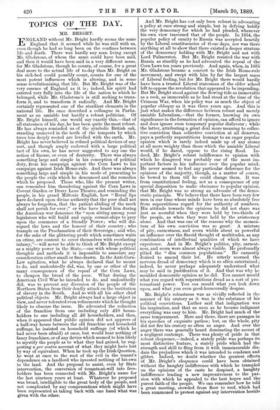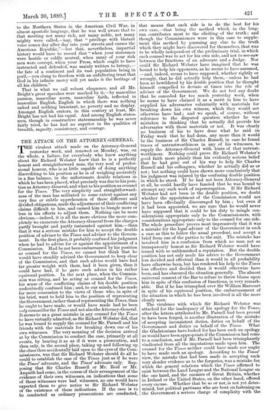TOPICS OF THE DAY.
MR. BRIGHT.
ENGLAND without Mr. Bright hardly seems the same England that it seemed while he was still with us, even though he had so long been on the confines between life and death. There was hardly any man living except Mr. Gladstone, of whom the same could have been said, and then it would have been said in a very different sense, for Mr. Gladstone, though he counts, of course, for a great deal more to the actual life of to-day than Mr. Bright on his sick-bed could possibly count, counts for one of the most potent influences which is altering, and in some sense revolutionising, that life. But Mr. Bright was of the very essence of England as it is ; indeed, his spirit had entered very fully into the life of the nation to which he belonged, while Mr. Gladstone's is still seeking to trans- form it, and to transform it radically. And Mr. Bright certainly represented one of the sturdiest elements in the national life. He once described a colleague in Parlia- ment as an amiable but hardly a robust politician. Of Mr. Bright himself, one would say exactly this,—that of all statesmen of his day, he has been quite the most robust. He has always reminded us of the symbolic British oak, standing unmoved in the teeth of the tempests by which trees less deeply rooted are levelled with the earth. Mr. Bright has never believed in refined political devices of any sort, and though amply endowed with a large political tact of his own, he has never - suggested to any one the notion of finesse, or even of dexterity. There was always something large and simple in his conception of political duty, from his campaign against the Corn Laws to his campaign against Irish Home-rule. And there was always something large and simple in his mode of presenting to the people the evils which he denounced and the remedies which he proposed. Those who, like the present writer, can remember him thundering against the Corn Laws in Covent Garden or Drury Lane Theatre, and reminding the people, in his grand Miitonic English, how " Royal lips have declared upon divine authority that the poor shall not always be forgotten, that the patient abiding of the meek shall not perish for ever ;" or who have heard him during the American war denounce the "men sitting among your legislators who will build and equip corsair-ships to prey upon the commerce of a friendly Power; who will dis- regard the laws and the honour of their country ; who trample on the Proclamation of their Sovereign ; and who, for the sake of the glittering profit which sometimes waits on crime, are content to cover themselves with everlasting infamy,"—will never be able to think of Mr. Bright except as a mighty power in the State,—one with whose political thoughts and methods it is impossible to associate any consideration either small or fine-drawn. In the Anti-Corn- Law agitation, what he always declared that he meant to do, and undoubtedly did, was, by one or other of the many consequences of the repeal of the Corn Laws, to cheapen the bread of the poor. What during the American Civil War he intended to do, and undoubtedly did, was to prevent any diversion of the people of the Northern States from their deadly attack on the institution of slavery in the South. And so with all his other chief political objects. Mr. Bright always had a large object in view, and never tolerated even refinements which he thought likely to obscure the issue. He advocated the reduction of the franchise from one including only £10 house- holders to one including all £6 householders, and then, when it appeared that public opinion did not approve of a half-way house between the old franchise and household suffrage, he insisted on household suffrage (of which he had never been afraid) at once, but would hear nothing of fancy franchises, or of any device which seemed to him likely to mystify the people as to what they had gained, by sug- gesting a per contra account of what they might have lost by way of equivalent. When he took up the Irish Question, he went at once to the root of the evil in the tenant's dependence on a landlord who invested nothing of his own in the land. And the proposal, to assist, even by State intervention, the conversion of tenants-at-will into free- holders has been connected with Mr. Bright's name for the last nineteen years at least. Whatever he proposed was broad, intelligible to the great body of the people, and not complicated by any compensations which might have been represented as taking back with one hand what was given with the other. And Mr. Bright has Lot only been robust in advocating a policy at once strong and simple, but in defying boldly the very democracy for which he had pleaded, whenever his own view traversed that of the people. In 1854, the popular policy of enmity to Russia was accepted heartily by the Liberal constituencies of those days, nor was there anything at all to show that there existed a deeper stratum of the democracy holding with Mr. Bright and not with Lord Palmerston. But Mr. Bright resisted the war with Russia as sturdily as he had advocated the repeal of the Corn Laws ten years previously. And again, when, in 1885 Mr. Gladstone became a convert to the Irish Home-rule movement, and swept with him by far the largest mass of Liberal feeling, but for Mr. Bright there would hardly have been a trusted Liberal statesman of the older school left to oppose the revolution that appeared to be impending.. But Mr. Bright stood against the flowing tide as immovable as a rock, as immovable as he had stood at the time of the Crimean War, when his policy was as much the object of popular obloquy as it was three years ago. And this is just what makes the difference between robust and merely amiable Liberalism,—that the former, knowing its own significance in the formation of opinion, can afford to ignore and does ignore even temporary popular disfavour ; while the latter, attributing a great deal more meaning to collec- tive conviction than collective conviction at all deserves, pays a perfectly superstitious homage to an eager popular opinion which is rarely indeed made up of any atoms at all more weighty than those which the amiable Liberal would, if he dared, oppose to the rising flood. In- deed, Mr. Bright's robust indifference to opinion with which he disagreed was probably one of the most im- portant factors in his influence over the popular mind.. He never seemed to feel any particular deference for the opinions of the majority, though, as a matter of course, he bowed to them till he could change them. It was from constitutional feeling, not as a consequence of any special disposition to make obeisance to popular opinion, that Mr. Bright was so strong an advocate of the demo- cratic principle. We believe that there have been very few men in our time whose minds have been so absolutely free from superstitious regard for the authority of numbers. His attitude towards the opinions he did not share was just as scornful when they were held by two-thirds of the people, as when they were held by the aristocracy alone. And that was one of the reasons why the momen- tum of his own conviction was so great. A mixture of pity, earnestness, and scorn wields about as powerful an influence over the flaccid thought of multitudes, as any combination of intellectual qualities of which we have experience. And in Mr. Bright's politics, pity, earnest- ness, and scorn were almost always visible. He profoundly pitied the " dim common populations." He earnestly desired to amend their lot. He utterly scorned the nervous dread of democracy which is so often entertained ; indeed, he never perhaps adequately understood what may be said in justification of it. And that was why he moulded democratic opinion as he did. You cannot mould what you regard with superstitious dread as a sort of pre- ternatural power. You can mould what you look down upon, and what you even good-humouredly despise.
Mr. Bright's robustness was as vividly reflected .in the manner of his oratory as it was in the substance of his political convictions. Luther said that indignation was his inspiration, and that as soon as he became indignant everything was easy to him. Mr. Bright had much of the same temperament. Here and there, there are passages in his speeches of exquisite pathos ; but, on the whole, pity did not fire his oratory so often as anger. And over the anger there was generally heard dominating the accent of a negligent contempt. There was plenty of pride in that robust eloquence, indeed, a, stately pride was perhaps its most distinctive feature, a stately pride which had the strength and skill to fling from it with immeasurable dis- dain the prejudices which it was intended to condemn and gibbet. Indeed, we doubt whether the greatest effects of Mr. Bright's eloquence could have been obtained without the haughty indifference with which he trampled on the opinions of the caste he despised, a haughty indifference lending a new impressiveness to the pas- sion with which he appealed to the best hopes and the purest faith of the people. We can remember how he told a great meeting, crowded from floor to roof, which had been summoned to protest against any intervention hostile to the Northern States in the American Civil War, in almost apostolic language, that he was well aware that to that meeting not many rich, not many noble, not many mighty were called,—nay, that " privilege with blatant voice comes day after day into your streets and curses the American Republic,"—but that, nevertheless, impartial history would have to record that "when your statesmen were hostile or coldly neutral, when many of your rich men were corrupt, when your Press, which ought to have instructed and defended, was mainly written to betray,— the fate of a continent and its vast population being in peril,—you clung to freedom with an unfaltering trust that God in his infinite mercy will yet make it the heritage of all his children."
. That is what we call robust eloquence, and all Mr. Bright's great speeches were marked by it,—by masculine passion, masculine scorn, masculine faith, reflected in masculine English, English in which there was nothing naked and nothing luxuriant, no poverty and no display. Amongst English orators, in this century at least, Mr. Bright has not had his equal. And among English states- men, though in constructive statesmanship he was never fairly tried, he has had no superior in the qualities of breadth, sagacity, consistency, and courage.



















































 Previous page
Previous page